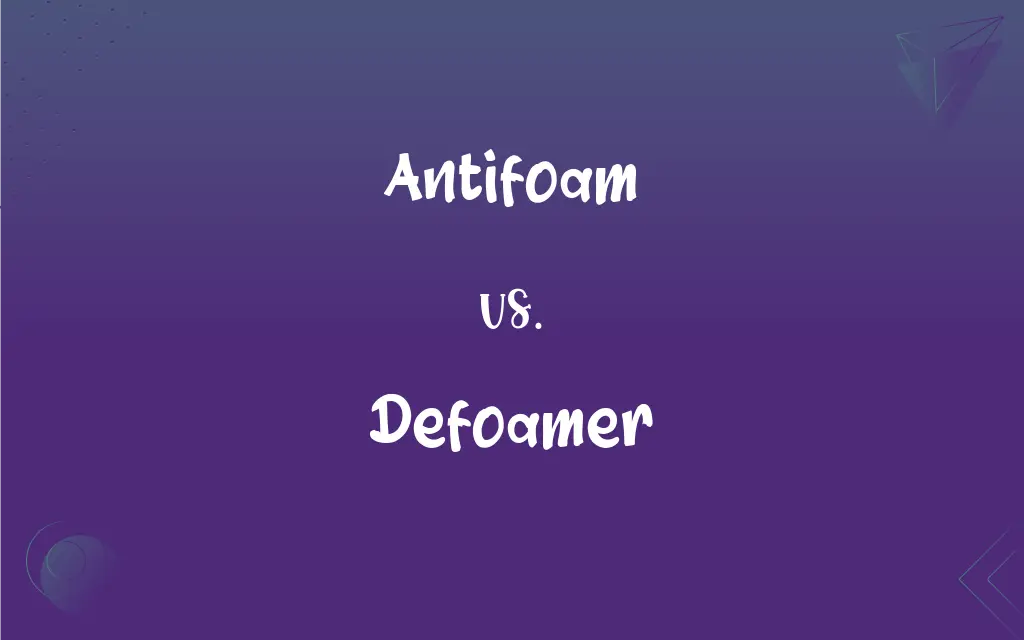Antifoam vs. Defoamer: What's the Difference?
Edited by Aimie Carlson || By Janet White || Published on January 30, 2024
Antifoam prevents the formation of foam, while defoamer is used to reduce or eliminate existing foam.

Key Differences
Antifoam agents are added to a liquid to prevent the formation of foam, acting proactively. Defoamers, on the other hand, are used reactively to reduce or eliminate foam that has already formed.
Defoamers often work by breaking down the surface tension of the foam, causing it to collapse. In contrast, antifoam agents are formulated to prevent foam bubbles from stabilizing and growing in the first place.
The application of antifoam is typically done before foam formation, as part of a process to ensure a foam-free environment. Defoamers are applied after foam is observed, to control or eliminate it.
In many industrial processes, antifoam is used as a preventive measure, particularly where foam formation can disrupt processes. Defoamers, however, are essential in situations where foam has occurred unexpectedly or unavoidably.
Antifoam products are often silicone-based or contain oils and waxes, designed to disperse quickly and prevent foam. Defoamers, which can be similar in composition, are designed to be more aggressive in breaking down existing foam.
ADVERTISEMENT
Comparison Chart
Purpose
Prevents foam formation.
Reduces or eliminates existing foam.
Application Timing
Used before foam forms.
Used after foam has formed.
Function
Prevents foam bubbles from stabilizing.
Breaks down surface tension of existing foam.
Typical Use
Proactive in foam-sensitive processes.
Reactive to control unexpected foam.
Composition
Often silicone-based, disperses quickly.
Similar, but more aggressive in action.
ADVERTISEMENT
Antifoam and Defoamer Definitions
Antifoam
Antifoam is used in various industries to maintain foam-free conditions.
Antifoam in the paper manufacturing process prevented machine clogging.
Defoamer
Defoamer is a chemical that reduces or eliminates existing foam.
They used a defoamer to clear the foam in the wastewater treatment plant.
Antifoam
Antifoam agents are substances used to stop foam from forming in liquids.
Antifoam was essential in the industrial cleaning process.
Defoamer
Defoamers are applied to break down the surface tension of foam.
The laundry industry frequently uses defoamers in their wash cycles.
Antifoam
Antifoam products are often added to food and beverages during production.
Antifoam ensured the quality of the soup by preventing foam.
Defoamer
Defoamers are essential in processes where foam is a by-product.
In the paint production, defoamer was used to remove unwanted foam.
Antifoam
Antifoam is a chemical additive that prevents the formation of foam.
The brewery added antifoam to the vat to prevent overflow.
Defoamer
Defoamer is often used in industrial cleaning to manage foam levels.
The defoamer quickly eliminated the foam in the cleaning machine.
Antifoam
Antifoam is essential in pharmaceutical manufacturing for controlling foam.
The antifoam agent was crucial during the fermentation process.
Defoamer
Defoamers can be oil-based, silicone-based, or water-based.
The silicone-based defoamer was effective in the hot tub.
Antifoam
Any chemical agent that inhibits the formation of foam.
Defoamer
Any chemical agent used for defoaming.
FAQs
How do defoamers break down foam?
Defoamers break down foam by reducing the surface tension of the bubbles, causing them to collapse.
What is the main difference between antifoam and defoamer?
Antifoam prevents foam formation, while defoamer eliminates existing foam.
Can antifoam and defoamer be used interchangeably?
While they have similar purposes, they are typically used in different stages of foam control.
How do I choose the right defoamer for my process?
The choice depends on the type of foam, the liquid's properties, and the process conditions.
Can antifoam agents be used in food processing?
Yes, food-grade antifoam agents are used in many food processing applications.
Are antifoam agents always effective?
Antifoam agents are generally effective, but their efficiency depends on the application and formulation.
Are there environmental concerns with using defoamers?
Some defoamers may have environmental impacts, so eco-friendly formulations are often preferred.
Is silicone the only base for antifoam agents?
No, antifoam agents can also be oil-based or water-based, among others.
Can I use a homemade defoamer?
Homemade defoamers might work for simple applications but are not recommended for industrial use.
Are there natural antifoam agents?
Yes, there are natural and organic antifoam agents available.
How are antifoam agents typically applied?
Antifoam agents are usually mixed into the liquid or applied to the surface to prevent foam formation.
Can antifoam affect the flavor of food products?
Food-grade antifoam is designed not to affect taste or quality.
Is it safe to use defoamers in aquariums?
Aquarium-safe defoamers are available, but one should ensure they are non-toxic to aquatic life.
Do defoamers affect the quality of the product?
Properly used, defoamers should not negatively impact the quality of the product.
Can antifoam be used in all types of liquids?
Antifoam is versatile but may need to be specifically formulated for certain types of liquids.
How quickly do defoamers work?
Defoamers often work rapidly, breaking down foam within minutes.
How does temperature affect antifoam efficiency?
The efficiency of antifoam can vary with temperature, and some are formulated for specific temperature ranges.
Can defoamers be used in both water-based and oil-based systems?
Yes, but the defoamer formulation must be compatible with the system.
How long do the effects of defoamers last?
The duration varies depending on the product formulation and the application.
Are there any industries where antifoam is particularly important?
Antifoam is crucial in industries like pharmaceuticals, food processing, and brewing, where foam can cause issues.
About Author
Written by
Janet WhiteJanet White has been an esteemed writer and blogger for Difference Wiki. Holding a Master's degree in Science and Medical Journalism from the prestigious Boston University, she has consistently demonstrated her expertise and passion for her field. When she's not immersed in her work, Janet relishes her time exercising, delving into a good book, and cherishing moments with friends and family.
Edited by
Aimie CarlsonAimie Carlson, holding a master's degree in English literature, is a fervent English language enthusiast. She lends her writing talents to Difference Wiki, a prominent website that specializes in comparisons, offering readers insightful analyses that both captivate and inform.

































































